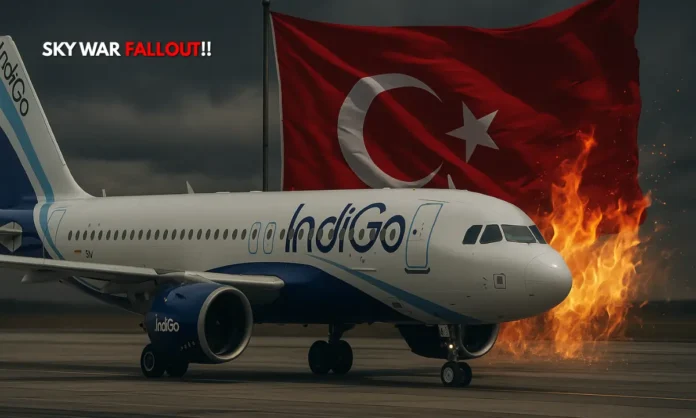Summary
- Following Operation Sindoor, calls to boycott Turkey have intensified due to Ankara’s military ties with Pakistan.
- Travel platforms like Cox & Kings and Ixigo suspended bookings to Turkey amid rising social media pressure.
- IndiGo and Air India’s partnerships with Turkish Airlines are under scrutiny, but commercial impact remains uncertain.
Beyond Borders: The Turkey–India Travel Rift Grows
What began as a military flashpoint is now reshaping commercial skies. In the wake of Operation Sindoor, India’s retaliatory strike against Pakistan following the Pahalgam terror attack, the geopolitical fallout has spilled over into aviation and tourism. Turkey, seen as an enabler of Pakistan’s military build-up, is now facing the full force of India’s digital diplomacy—calls to boycott Turkey are surging.
From trending hashtags to viral WhatsApp lists, Turkish affiliations across sectors are being called out. Travel platforms Cox & Kings and Ixigo have suspended Turkey bookings. Meanwhile, Turkish Airlines’ commercial and technical partnerships with IndiGo and Air India are under fire, placing aviation in the crosshairs of public sentiment.
Yet, despite the noise, the deeper question remains: will this boycott impact India’s travel behavior or remain just another trend in the theatre of geopolitical outrage?
🚨 Dear INDIGO…✈️
— CA Anil Singhvi Zee Business (@AnilSinghvi_) May 14, 2025
It's high time to say Turkey Airlines (Turkey Air-LIES) a "Big NO…"🚫
पाकिस्तान का साथ देने वाले Turkey के साथ नहीं होनी चाहिए #Indigo की कोई भी Partnership…❌️
कोई भी हिंदुस्तानी नहीं करना चाहता Turkey Airlines से अपनी कोई भी Trip…☝️#Indigo… pic.twitter.com/Crr8ZKhOwf
Hashtags vs. Hardware: Why Turkey’s Role Sparked Outrage
- Turkey has supplied drones and military hardware to Pakistan, some reportedly used against India.
- Flight data revealed Turkish-Pakistani military aviation coordination, intensifying scrutiny.
- Ankara’s vocal diplomatic support for Islamabad further fueled Indian anger.
- Online calls to boycott Turkish brands and travel surged post-Operation Sindoor.
Unlike previous boycott waves triggered by domestic controversies, the anti-Turkey sentiment hinges on tangible military cooperation. As reports surfaced linking Turkish drones to Pakistan’s recent cross-border operations and military aircraft exchanges between Ankara and Islamabad, public discourse took a sharp turn.
India’s retaliation under Operation Sindoor ignited nationalist fervor online, but the discovery that NATO-member Turkey could be indirectly arming Pakistan sparked indignation beyond patriotic reflex. WhatsApp groups and social media influencers began circulating lists of Turkish-linked companies, including Turkish Airlines, Celebi ground handling, and even Turkish soap and food brands sold in Indian supermarkets.
This echoes the trajectory of the China boycott following the Galwan clash in 2020 and the “Boycott Maldives” trend after political tensions earlier in 2024. But whether this call to boycott Turkey will generate real-world consequences remains uncertain.
IndiGo & Air India in the Eye of the Storm
- IndiGo has a major codeshare with Turkish Airlines and uses its widebody aircraft for Europe routes.
- Turkish Technic handles maintenance for both Air India and IndiGo aircraft.
- Turkish firm Celebi provides ground handling at major Indian airports, including during the G20 Summit.
- Despite online anger, passengers have limited alternatives due to the duopoly of IndiGo and Air India.
With a market share of over 90% combined, IndiGo and the Air India group dominate Indian skies. This leaves little room for consumer protest to meaningfully alter aviation alliances—at least in the short term.
IndiGo’s partnership with Turkish Airlines dates back to 2018, including codeshare agreements and damp-leased widebody aircraft. It also relies on Turkish aviation firm Corendon for capacity support. Air India, too, has used Turkish Technic for component and maintenance contracts, even as recently as February 2025.
These ties go beyond shared routes—they’re embedded in the technical and operational infrastructure of Indian aviation. Cutting these connections overnight is not just logistically complicated; it’s commercially unfeasible.
Still, the optics matter. IndiGo operates two daily flights to Turkey. If these routes see a sharp drop in bookings, the airline may be forced to respond. For now, neither IndiGo nor Air India has issued a public statement.
Boycotts and Their Broken Promises
- “Boycott China” saw little long-term impact, with trade between the two nations rising post-2020.
- Maldives saw a 37% drop in Indian tourist arrivals in 2024 following viral boycott calls.
- Analysts say social media outrage rarely translates into sustained commercial damage without state policy.
- Airlines usually assess impact over quarters, not hashtags.
If history is a guide, social media outrage doesn’t always equate to commercial action. Post-Galwan, Indian imports from China increased from $68 billion in 2019 to over $109 billion in 2024. The rhetoric didn’t match the trade data.
But the Maldives example shows boycotts can work—if the sentiment aligns with travel alternatives and sustained media narratives. Maldives tourism from India dropped by 37% in one year after PM Modi’s pivot to Lakshadweep gained traction and diplomatic tensions escalated.
In Turkey’s case, the deciding factor will be flight occupancy over the coming weeks. If travel sentiment shifts decisively, as it did with the Maldives, then the IndiGo–Turkish alliance could face pressure. Until then, airlines will likely observe rather than react.
Altitude, Alliances, and Accountability
Boycott calls often feel cathartic. They create a sense of agency in moments when diplomacy is abstract and war is far away. But the India–Turkey aviation nexus reveals how global conflict zones now intersect with consumer choices and digital protest.
For now, Indian aviation’s deep entanglement with Turkish partners suggests this storm may pass without major disruption. But the real test will come not on social media—but at boarding gates and booking counters.
If consumer behavior shifts, even duopolies must listen. If not, it will be yet another trend that vanished into the clouds.


